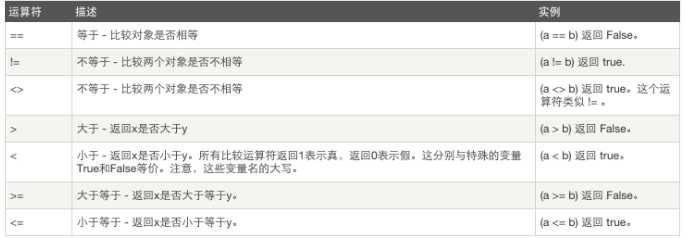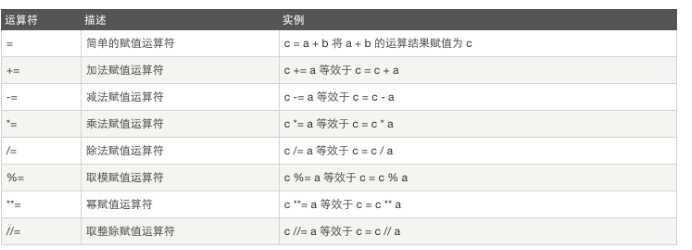标签:imp start parse sel _for 对齐 nes sdi ber
1、算数运算:

2、比较运算:

3、赋值运算:

4、逻辑运算:

5、成员运算:

1、数字:
int(整型)
在32位机器上,整数的位数为32位,取值范围为-2**31~2**31-1,即-2147483648~2147483647
在64位系统上,整数的位数为64位,取值范围为-2**63~2**63-1,即-9223372036854775808~9223372036854775807

class int(object): def bit_length(self): """ 返回表示该数字的时占用的最少位数 """ """ int.bit_length() -> int Number of bits necessary to represent self in binary. >>> bin(37) ‘0b100101‘ >>> (37).bit_length() """ return 0 def conjugate(self, *args, **kwargs): # real signature unknown """ 返回该复数的共轭复数 """ """ Returns self, the complex conjugate of any int. """ pass def __abs__(self): """ 返回绝对值 """ """ x.__abs__() <==> abs(x) """ pass def __add__(self, y): """ x.__add__(y) <==> x+y """ pass def __and__(self, y): """ x.__and__(y) <==> x&y """ pass def __cmp__(self, y): """ 比较两个数大小 """ """ x.__cmp__(y) <==> cmp(x,y) """ pass def __coerce__(self, y): """ 强制生成一个元组 """ """ x.__coerce__(y) <==> coerce(x, y) """ pass def __divmod__(self, y): """ 相除,得到商和余数组成的元组 """ """ x.__divmod__(y) <==> divmod(x, y) """ pass def __div__(self, y): """ x.__div__(y) <==> x/y """ pass def __float__(self): """ 转换为浮点类型 """ """ x.__float__() <==> float(x) """ pass def __floordiv__(self, y): """ x.__floordiv__(y) <==> x//y """ pass def __format__(self, *args, **kwargs): # real signature unknown pass def __getattribute__(self, name): """ x.__getattribute__(‘name‘) <==> x.name """ pass def __getnewargs__(self, *args, **kwargs): # real signature unknown """ 内部调用 __new__方法或创建对象时传入参数使用 """ pass def __hash__(self): """如果对象object为哈希表类型,返回对象object的哈希值。哈希值为整数。在字典查找中,哈希值用于快速比较字典的键。两个数值如果相等,则哈希值也相等。""" """ x.__hash__() <==> hash(x) """ pass def __hex__(self): """ 返回当前数的 十六进制 表示 """ """ x.__hex__() <==> hex(x) """ pass def __index__(self): """ 用于切片,数字无意义 """ """ x[y:z] <==> x[y.__index__():z.__index__()] """ pass def __init__(self, x, base=10): # known special case of int.__init__ """ 构造方法,执行 x = 123 或 x = int(10) 时,自动调用,暂时忽略 """ """ int(x=0) -> int or long int(x, base=10) -> int or long Convert a number or string to an integer, or return 0 if no arguments are given. If x is floating point, the conversion truncates towards zero. If x is outside the integer range, the function returns a long instead. If x is not a number or if base is given, then x must be a string or Unicode object representing an integer literal in the given base. The literal can be preceded by ‘+‘ or ‘-‘ and be surrounded by whitespace. The base defaults to 10. Valid bases are 0 and 2-36. Base 0 means to interpret the base from the string as an integer literal. >>> int(‘0b100‘, base=0) # (copied from class doc) """ pass def __int__(self): """ 转换为整数 """ """ x.__int__() <==> int(x) """ pass def __invert__(self): """ x.__invert__() <==> ~x """ pass def __long__(self): """ 转换为长整数 """ """ x.__long__() <==> long(x) """ pass def __lshift__(self, y): """ x.__lshift__(y) <==> x<<y """ pass def __mod__(self, y): """ x.__mod__(y) <==> x%y """ pass def __mul__(self, y): """ x.__mul__(y) <==> x*y """ pass def __neg__(self): """ x.__neg__() <==> -x """ pass @staticmethod # known case of __new__ def __new__(S, *more): """ T.__new__(S, ...) -> a new object with type S, a subtype of T """ pass def __nonzero__(self): """ x.__nonzero__() <==> x != 0 """ pass def __oct__(self): """ 返回改值的 八进制 表示 """ """ x.__oct__() <==> oct(x) """ pass def __or__(self, y): """ x.__or__(y) <==> x|y """ pass def __pos__(self): """ x.__pos__() <==> +x """ pass def __pow__(self, y, z=None): """ 幂,次方 """ """ x.__pow__(y[, z]) <==> pow(x, y[, z]) """ pass def __radd__(self, y): """ x.__radd__(y) <==> y+x """ pass def __rand__(self, y): """ x.__rand__(y) <==> y&x """ pass def __rdivmod__(self, y): """ x.__rdivmod__(y) <==> divmod(y, x) """ pass def __rdiv__(self, y): """ x.__rdiv__(y) <==> y/x """ pass def __repr__(self): """转化为解释器可读取的形式 """ """ x.__repr__() <==> repr(x) """ pass def __str__(self): """转换为人阅读的形式,如果没有适于人阅读的解释形式的话,则返回解释器课阅读的形式""" """ x.__str__() <==> str(x) """ pass def __rfloordiv__(self, y): """ x.__rfloordiv__(y) <==> y//x """ pass def __rlshift__(self, y): """ x.__rlshift__(y) <==> y<<x """ pass def __rmod__(self, y): """ x.__rmod__(y) <==> y%x """ pass def __rmul__(self, y): """ x.__rmul__(y) <==> y*x """ pass def __ror__(self, y): """ x.__ror__(y) <==> y|x """ pass def __rpow__(self, x, z=None): """ y.__rpow__(x[, z]) <==> pow(x, y[, z]) """ pass def __rrshift__(self, y): """ x.__rrshift__(y) <==> y>>x """ pass def __rshift__(self, y): """ x.__rshift__(y) <==> x>>y """ pass def __rsub__(self, y): """ x.__rsub__(y) <==> y-x """ pass def __rtruediv__(self, y): """ x.__rtruediv__(y) <==> y/x """ pass def __rxor__(self, y): """ x.__rxor__(y) <==> y^x """ pass def __sub__(self, y): """ x.__sub__(y) <==> x-y """ pass def __truediv__(self, y): """ x.__truediv__(y) <==> x/y """ pass def __trunc__(self, *args, **kwargs): """ 返回数值被截取为整形的值,在整形中无意义 """ pass def __xor__(self, y): """ x.__xor__(y) <==> x^y """ pass denominator = property(lambda self: object(), lambda self, v: None, lambda self: None) # default """ 分母 = 1 """ """the denominator of a rational number in lowest terms""" imag = property(lambda self: object(), lambda self, v: None, lambda self: None) # default """ 虚数,无意义 """ """the imaginary part of a complex number""" numerator = property(lambda self: object(), lambda self, v: None, lambda self: None) # default """ 分子 = 数字大小 """ """the numerator of a rational number in lowest terms""" real = property(lambda self: object(), lambda self, v: None, lambda self: None) # default """ 实属,无意义 """ """the real part of a complex number""" int

class str(basestring): def capitalize(self): """ 首字母变大写 """ """ 一般lstrip().capitalize()连起来使用,去掉左侧空格并讲对象首字母大写 print(" abc".lstrip().capitalize()) >>>Abc """ return "" def center(self, width, fillchar=None): """ 内容居中,width:总长度;fillchar:空白处填充内容,默认无 """ """ print("合同".center(4,"=")) >>>==合同== """ return "" def count(self, sub, start=None, end=None): """ 统计字符串里某个字符出现的次数。可选参数为在字符串搜索的开始与结束位置 """ """ print("baadefg".count("a", 0, 3)) >>>2 """ return 0 def decode(self, encoding=None, errors=None): """ 解码 """ """ 以后补充 """ return object() def encode(self, encoding=None, errors=None): """ 编码,针对unicode """ """ S.encode([encoding[,errors]]) -> object """ return object() def endswith(self, suffix, start=None, end=None): """判断字符串(范围可选)是否以指定后缀结尾, 是返回True否则False """ """ S.endswith(suffix[, start[, end]]) -> bool print("www.baidu.com".endswith(".com")) >>>True startswith() #判断以xxx开头 """ return False def expandtabs(self, tabsize=None): """ 将tab转换成空格,默认一个tab转换成8个空格 """ """ S.expandtabs([tabsize]) -> string """ return "" def find(self, sub, start=None, end=None): """ 寻找子序列位置,多次出现只返回第一个的索引值,如果没找到,返回 -1 """ """ S.find(sub [,start [,end]]) -> int print("tooladminroot".find("o", 0, 4)) >>>1 """ return 0 def format(*args, **kwargs): # known special case of str.format """ 字符串格式化,动态参数,,类似%,后面用一篇文章介绍这个方法 """ """ S.format(*args, **kwargs) -> string """ pass def index(self, sub, start=None, end=None): """ 子序列位置,如果没找到,报错 """ S.index(sub [,start [,end]]) -> int """ return 0 def isalnum(self): """ 是否是字母和数字组成并返回True或Fslse """ """ S.isalnum() -> bool """ return False def isalpha(self): """ 检查是否只有字母,返回True Fslse """ """ S.isalpha() -> bool """ return False def isdigit(self): """ 是否只有数字,返回True Fslse """ """ S.isdigit() -> bool """ return False def islower(self): """ 是否小写字母组成, 返回True False """ """ S.islower() -> bool """ return False def isspace(self): """是否大写字母组成, 返回True False""" """ S.isspace() -> bool """ return False def istitle(self): """ 所有单词的首字母是否大写, 返回True False S.istitle() -> bool """ return False def isupper(self): """ 是否大写字母组成, 返回True False S.isupper() -> bool """ return False def join(self, iterable): """ 连接,拼接 """ """ S.join(iterable) -> string Return a string which is the concatenation of the strings in the iterable. The separator between elements is S. """ return "" def ljust(self, width, fillchar=None): """ 返回字符串左对齐,并使用空格(可设置)填充至指定长度的新字符串。 如果指定的长度小于原字符串的长度则返回原字符串。 """ """ S.ljust(width[, fillchar]) -> string print("123".ljust(6, "k")) >>>123kkk print("123".ljust(3, "k")) >>>123 """ return "" def lower(self): """ 变小写 """ """ S.lower() -> string """ return "" def lstrip(self, chars=None): """ 移除左侧空白 """ """ S.lstrip([chars]) -> string or unicode """ return "" def partition(self, sep): """ 分割,前,中,后三部分,返回一个3元元组 """ """ S.partition(sep) -> (head, sep, tail) print("www.baidu.com".partition("baidu")) >>>(‘www.‘, ‘baidu‘, ‘.com‘) """ pass def replace(self, old, new, count=None): """ 替换,可以限制次数""" """ S.replace(old, new[, count]) -> string print("www.baidu.com.www".replace("www", "wap", 1)) >>>wap.baidu.com.www """ return "" def rfind(self, sub, start=None, end=None): """ S.rfind(sub [,start [,end]]) -> int 返回字符串最后一次出现的索引位置。如果没返回-1,可选范围 """ return 0 def rindex(self, sub, start=None, end=None): """ S.rindex(sub [,start [,end]]) -> int 返回字符串最后一次出现的索引位置。如果没返回-1,可选范围,如果找不到直接报异常substring not found """ return 0 def rjust(self, width, fillchar=None): """ S.rjust(width[, fillchar]) -> string 返回一个原字符串右对齐,并使用指定的字符填充至长度 width 的新字符串。 如果指定的长度小于字符串的长度则返回原字符串。zfill则只能填充0 print("123".rjust(4, ‘0‘)) >>>0123 print("123".rjust2, ‘0‘)) >>>123 """ return "" def rpartition(self, sep): """ 类似rpartition具体的以后在查 S.rpartition(sep) -> (head, sep, tail) Search for the separator sep in S, starting at the end of S, and return the part before it, the separator itself, and the part after it. If the separator is not found, return two empty strings and S. """ pass def rsplit(self, sep=None, maxsplit=None): """ S.rsplit([sep [,maxsplit]]) -> list of strings Return a list of the words in the string S, using sep as the delimiter string, starting at the end of the string and working to the front. If maxsplit is given, at most maxsplit splits are done. If sep is not specified or is None, any whitespace string is a separator. """ return [] def rstrip(self, chars=None): """ S.rstrip([chars]) -> string or unicode Return a copy of the string S with trailing whitespace removed. If chars is given and not None, remove characters in chars instead. If chars is unicode, S will be converted to unicode before stripping """ return "" def split(self, sep=None, maxsplit=None): """ 通过指定分隔符进行切片,默认是空格,换行符 可以跟切片次数 """ """ S.split([sep [,maxsplit]]) -> list of strings print("who m i i".split(" ", 2)) >>>[‘who‘, ‘m‘, ‘i i‘] """ return [] def splitlines(self, keepends=False): """ S.splitlines(keepends=False) -> list of strings 按照行(‘\r‘, ‘\r\n‘, \n‘)分隔,返回一个包含各行作为元素的列表, 如果参数 keepends 为 False,会去掉换行符,如果为 True,则保留换行符。 """ return [] def startswith(self, prefix, start=None, end=None): """判断字符串是否以指定起始, 是返回True,不是返回False """ """ S.startswith(prefix[, start[, end]]) -> bool """ return False def strip(self, chars=None): """ 移除开头结尾指定的字符串""" """ S.strip([chars]) -> string or unicode prinr(" www.baidu.com ".strip(" ")) >>>www.baidu.com """ return "" def swapcase(self): """ 大写变小写,小写变大写 """ """ S.swapcase() -> string """ return "" def title(self): """ S.title() -> string 将所有单词的首字母大写 """ return "" def translate(self, table, deletechars=None): """ 转换,需要先做一个对应表,最后一个表示删除字符集合 intab = "aeiou" outtab = "12345" trantab = maketrans(intab, outtab) str = "this is string example....wow!!!" print str.translate(trantab, ‘xm‘) """ """ S.translate(table [,deletechars]) -> string Return a copy of the string S, where all characters occurring in the optional argument deletechars are removed, and the remaining characters have been mapped through the given translation table, which must be a string of length 256 or None. If the table argument is None, no translation is applied and the operation simply removes the characters in deletechars. """ return "" def upper(self): """ S.upper() -> string 将字符串中的小写字母转化成为大写字母 """ return "" def zfill(self, width): """方法返回指定长度的字符串,原字符串右对齐,前面填充0。""" """ S.zfill(width) -> string Pad a numeric string S with zeros on the left, to fill a field of the specified width. The string S is never truncated. """ return "" def _formatter_field_name_split(self, *args, **kwargs): # real signature unknown pass def _formatter_parser(self, *args, **kwargs): # real signature unknown pass def __add__(self, y): """ x.__add__(y) <==> x+y """ pass def __contains__(self, y): """ x.__contains__(y) <==> y in x """ pass def __eq__(self, y): """ x.__eq__(y) <==> x==y """ pass def __format__(self, format_spec): """ S.__format__(format_spec) -> string Return a formatted version of S as described by format_spec. """ return "" def __getattribute__(self, name): """ x.__getattribute__(‘name‘) <==> x.name """ pass def __getitem__(self, y): """ x.__getitem__(y) <==> x[y] """ pass def __getnewargs__(self, *args, **kwargs): # real signature unknown pass def __getslice__(self, i, j): """ x.__getslice__(i, j) <==> x[i:j] Use of negative indices is not supported. """ pass def __ge__(self, y): """ x.__ge__(y) <==> x>=y """ pass def __gt__(self, y): """ x.__gt__(y) <==> x>y """ pass def __hash__(self): """ x.__hash__() <==> hash(x) """ pass def __init__(self, string=‘‘): # known special case of str.__init__ """ str(object=‘‘) -> string Return a nice string representation of the object. If the argument is a string, the return value is the same object. # (copied from class doc) """ pass def __len__(self): """ x.__len__() <==> len(x) """ pass def __le__(self, y): """ x.__le__(y) <==> x<=y """ pass def __lt__(self, y): """ x.__lt__(y) <==> x<y """ pass def __mod__(self, y): """ x.__mod__(y) <==> x%y """ pass def __mul__(self, n): """ x.__mul__(n) <==> x*n """ pass @staticmethod # known case of __new__ def __new__(S, *more): """ T.__new__(S, ...) -> a new object with type S, a subtype of T """ pass def __ne__(self, y): """ x.__ne__(y) <==> x!=y """ pass def __repr__(self): """ x.__repr__() <==> repr(x) """ pass def __rmod__(self, y): """ x.__rmod__(y) <==> y%x """ pass def __rmul__(self, n): """ x.__rmul__(n) <==> n*x """ pass def __sizeof__(self): """ S.__sizeof__() -> size of S in memory, in bytes """ pass def __str__(self): """ x.__str__() <==> str(x) """ pass str
标签:imp start parse sel _for 对齐 nes sdi ber
原文地址:http://www.cnblogs.com/whjlinux/p/7424369.html